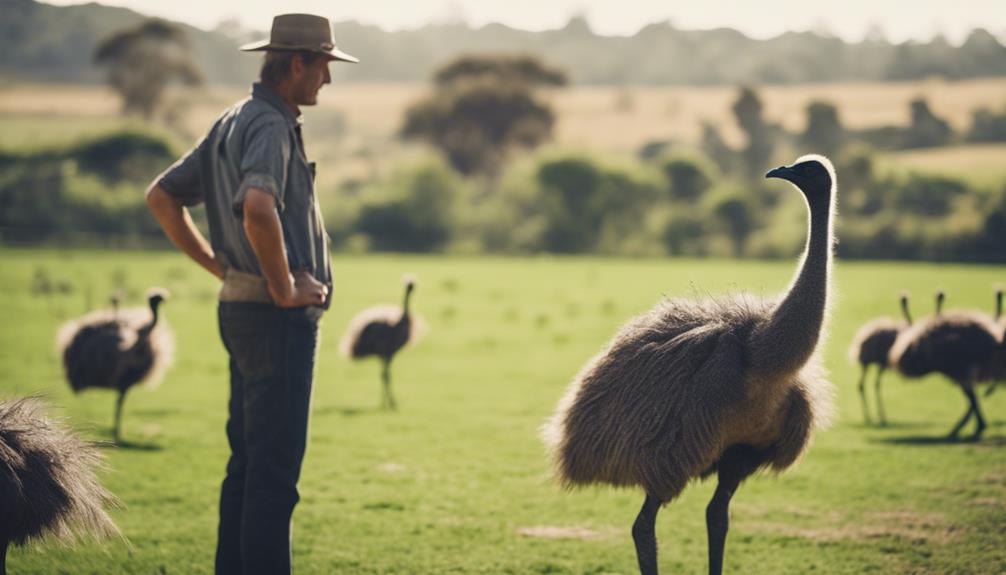
As you contemplate the vast expanses of success achieved by these emu farming families, you may find yourself intrigued by the untold challenges they faced and the triumphs they celebrated. The intricate web of strategies they weaved to navigate the complexities of the industry could offer valuable insights into what it truly takes to prosper in this unique agricultural domain. By exploring the paths they tread and the lessons they learned, you might uncover a tapestry of resilience and determination that could reshape your perspective on the possibilities within emu farming.
Key Takeaways
- Smiths from Queensland excelling with advanced breeding techniques.
- Johnson family in New South Wales succeeding through strategic marketing.
- Thompsons from Western Australia thriving by diversifying product range.
- Leveraging unique strengths and teamwork for industry success.
- Showcasing dedication and innovation for sustainable growth.
The Beginning of a Journey

At the outset of your emu farming journey, aspiring farmers often encounter a multitude of challenges that test your resolve and determination. Starting an emu farm requires meticulous planning, substantial financial investment, and a deep understanding of the industry. You must first secure appropriate land for the emus to roam freely and have adequate shelter. Building suitable enclosures, fences, and feeding stations is crucial for the well-being of the emus and the success of your farm.
Furthermore, you need to acquire the necessary permits and licenses to legally operate an emu farm. Understanding the regulations and requirements set by local authorities is essential to avoid any legal issues that could jeopardize your venture. Additionally, sourcing high-quality emu eggs or chicks from reputable breeders is vital to kickstart your farm with healthy and genetically sound birds.
In this initial phase, aspiring emu farmers must also invest time in learning about emu behavior, nutrition, and healthcare to ensure the welfare of their birds. Conducting thorough research and seeking advice from experienced farmers can help you navigate the challenges that come with starting an emu farm.
Overcoming Adversity
After establishing the foundation of your emu farm, navigating and overcoming adversity becomes a defining aspect of your journey towards success. Adversity in emu farming can manifest in various forms, such as extreme weather conditions, disease outbreaks among the flock, or market fluctuations. To combat these challenges, a powerful mindset and strategic planning are essential.
In the face of unpredictable weather patterns, you must fortify your farm infrastructure to withstand harsh conditions. This could involve reinforcing shelters, implementing effective drainage systems, and ensuring access to clean water sources. Additionally, developing a contingency plan for emergencies will help you respond swiftly and decisively when adversity strikes.
When dealing with health issues within your emu flock, swift action is paramount. Regular health checks, vaccination protocols, and quarantine measures can help prevent the spread of diseases. Collaborating with veterinary experts and staying informed about the latest advancements in emu healthcare are crucial steps in overcoming health-related challenges.
Market fluctuations can also pose significant obstacles to your emu farming success. Diversifying your product offerings, building strong relationships with buyers, and staying adaptable to changing market trends are key strategies for navigating economic uncertainties. By embracing challenges head-on and proactively addressing adversity, you can steer your emu farm towards continued growth and prosperity.
Innovating Farming Practices
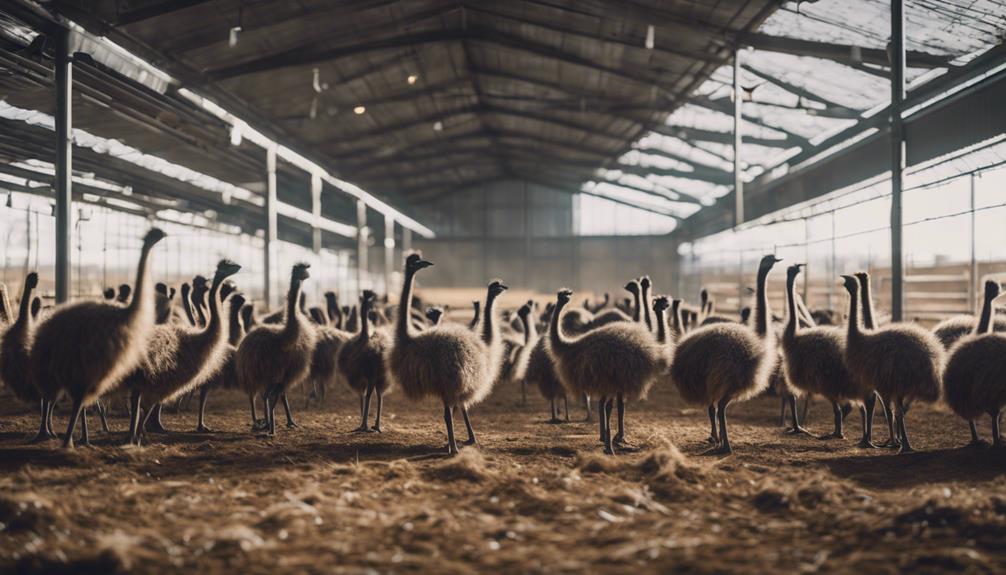
To enhance the efficiency and productivity of your emu farm, implementing innovative farming practices is crucial. By staying ahead of the curve and adopting modern techniques, you can maximize your yields and ensure the success of your operation. One way to achieve this is by incorporating the latest advancements in emu farming technology and management strategies.
| Innovative Farming Practices | Description | Benefits |
|---|---|---|
| Automated Feeding Systems | Utilize automated feeders to ensure consistent and timely feeding schedules, reducing labor costs and minimizing feed wastage. | – Time-saving – Cost-effective – Improved feed efficiency |
| Precision Breeding Programs | Implement selective breeding programs based on genetic traits to enhance desirable characteristics in your emus, such as growth rate and meat quality. | – Higher quality offspring – Increased productivity – Enhanced genetic diversity |
| Environmental Monitoring | Install sensors to track temperature, humidity, and other environmental factors to optimize living conditions for your emus, promoting their health and well-being. | – Healthier birds – Decreased mortality rates – Improved overall farm performance |
Family Success Stories
Implementing innovative farming practices has been a key factor in the success stories of many emu farming families, revolutionizing their operations and yielding significant benefits. Families like the Smiths from Queensland have seen remarkable growth by incorporating advanced breeding techniques, resulting in healthier emus and higher-quality products. The Johnson family in New South Wales stands out for their strategic marketing approach, creating a strong brand presence that has increased demand for their emu oil and meat products. These families showcase the power of teamwork and dedication in achieving success in the emu farming industry.
Moreover, the Thompsons from Western Australia have excelled in diversifying their product range, offering emu feather crafts and decorative items in addition to traditional emu-based products. This diversification strategy hasn't only boosted their revenue but has also attracted a wider customer base. By leveraging their unique strengths and working together, these emu farming families have carved out a niche in the market, setting a powerful example for others in the industry.
Sustainable Farming Practices
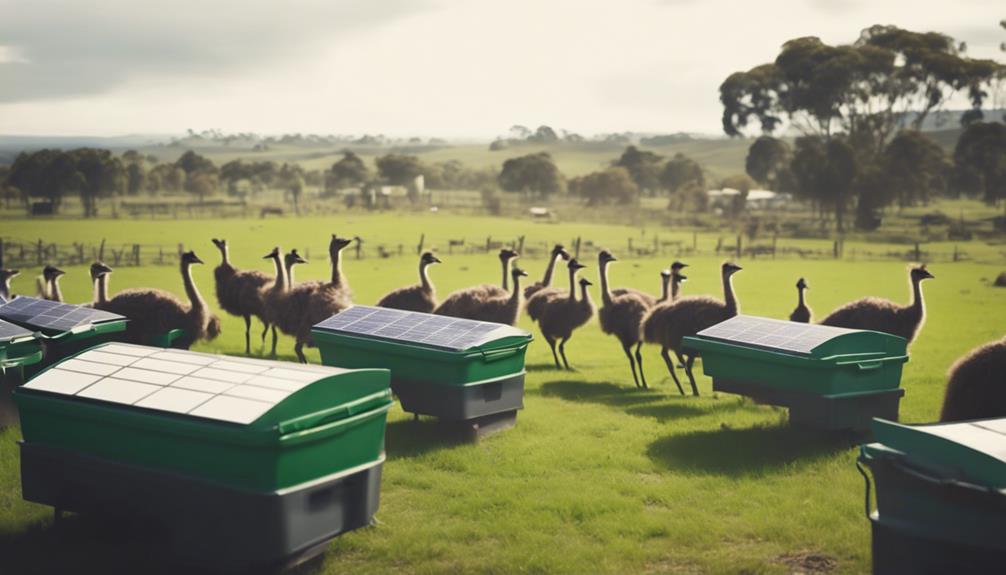
In exploring sustainable farming practices within the emu farming industry, a shift towards environmentally-friendly methods has become increasingly prevalent among successful farmers. One key practice adopted by these farmers is rotational grazing, where emus are moved between different pastures to prevent overgrazing and soil degradation. This method not only helps maintain the health of the land but also ensures that the emus have access to fresh vegetation, promoting their overall well-being.
Moreover, successful emu farmers prioritize water conservation by implementing efficient irrigation systems and rainwater harvesting techniques. By optimizing water usage, they not only reduce costs but also contribute to the preservation of this critical resource. Additionally, these farmers often utilize organic fertilizers and pest control methods to minimize the environmental impact of their operations.
Diversifying Revenue Streams
Diversifying revenue streams in emu farming involves exploring alternative income sources to enhance financial stability and growth. One effective way to diversify revenue is by producing emu oil and emu meat products for sale. Emu oil is in high demand for its medicinal and cosmetic properties, while emu meat is sought after by consumers looking for lean, healthy protein options. By tapping into these markets, you can increase your profitability significantly.
Another avenue to explore is the sale of emu feathers and eggs. Emu feathers are valued for their use in crafts, fashion, and décor, providing an additional source of income. Emu eggs, known for their unique appearance and size, are also sought after by collectors and artists. By marketing these products effectively, you can open up new revenue streams for your emu farming business.
Furthermore, offering agrotourism experiences, such as farm tours, educational workshops, or even hosting events, can attract additional income while promoting your emu farm. These activities not only generate revenue but also help build a loyal customer base and community support, contributing to the overall success and sustainability of your emu farming venture.
Community Engagement

To foster a strong sense of community support and connection, engaging with local residents and organizations can greatly benefit your emu farming operation. By actively involving the community, you not only create a network of support but also increase awareness about your farm and its products. Here is a table highlighting the key benefits of community engagement:
| Benefits of Community Engagement | Description |
|---|---|
| Increased brand visibility | Hosting farm tours or participating in local events can raise awareness about your emu products. |
| Access to local resources | Collaborating with community members can provide opportunities for shared resources and knowledge. |
| Building customer loyalty | Engaging with customers on a personal level fosters loyalty and repeat business. |
| Support in times of need | A strong community network can offer assistance during challenging times or emergencies. |
Engaging with the community not only strengthens your farm operation but also contributes to the overall growth and sustainability of your emu farming business.
Marketing Strategies That Work
Implementing effective marketing strategies is crucial for the success of your emu farming business. To ensure you reach your target market and maximize profitability, consider the following strategies:
- Create a Strong Online Presence: Develop a professional website showcasing your emu products and services. Utilize social media platforms to engage with potential customers and promote your brand.
- Participate in Agricultural Fairs and Expos: Attend relevant events to network with other industry professionals and potential buyers. This can help increase visibility and attract new customers to your emu farm.
- Offer Promotions and Discounts: Implement special promotions or discounts to incentivize customers to try your emu products. This can help generate interest and encourage repeat business.
- Collaborate with Local Businesses: Partner with local restaurants, health stores, or spas to feature your emu products. Building strategic partnerships can expand your reach and attract diverse customer segments.
Investing in Quality Care
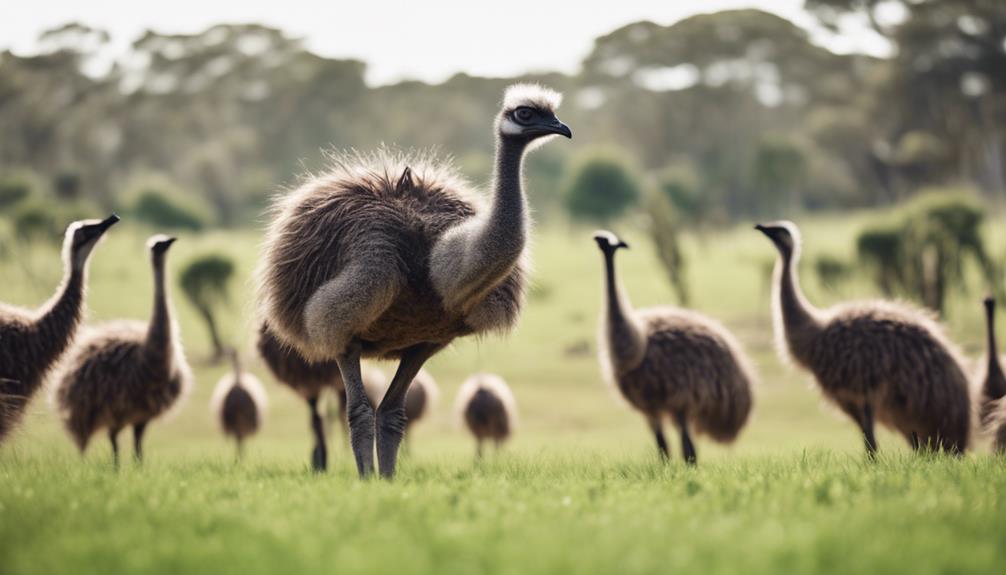
Investing in quality care for your emus is fundamental to ensuring their health and well-being, which directly impacts the success of your emu farming business. Proper nutrition is key. Emus require a diet rich in protein, fiber, and essential nutrients. Ensure access to clean water at all times and monitor their intake to prevent dehydration. Regular veterinary check-ups are crucial to detect and prevent diseases early on. Emus are hardy birds, but proactive care is always better than reactive treatment.
Maintaining a clean and spacious living environment is paramount. Emus need ample space to move around and exercise. Regularly clean their living areas to prevent the spread of diseases and infections. Providing shelter from extreme weather conditions is crucial for their well-being.
Invest in quality fencing to secure your emu enclosures and protect them from predators. Regularly inspect fences for any damages or weaknesses. Emus are curious creatures and can sometimes injure themselves if the fencing isn't secure.
Expanding Market Reach
Expanding your market reach requires strategic planning and targeted efforts to attract new customers and increase sales. To effectively grow your emu farming business, consider the following tactics:
- Diversify Product Offerings: Introduce new emu-based products such as oils, feathers, or handicrafts to appeal to a wider customer base.
- Utilize Online Platforms: Establish a strong online presence through e-commerce websites and social media platforms to reach customers beyond your local market.
- Attend Trade Shows: Participate in industry-related trade shows and events to showcase your products and network with potential buyers.
- Collaborate with Retailers: Partner with local stores, spas, or wellness centers to stock your emu products and increase visibility.
Lessons Learned
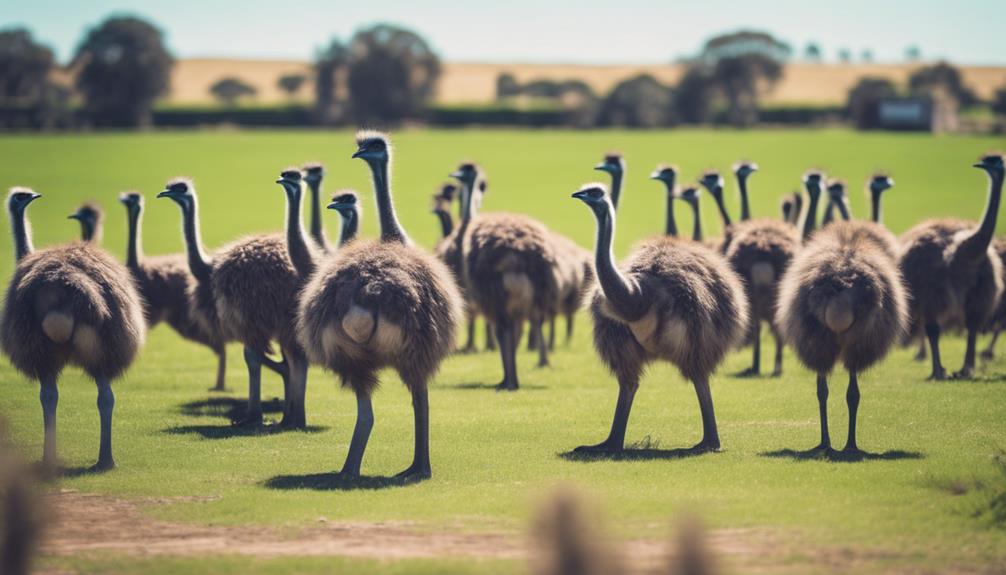
Throughout the journey of emu farming success, invaluable lessons have been gleaned, shaping the strategies and practices of thriving emu farmers. One crucial lesson learned is the importance of proper nutrition for emus. Ensuring a balanced diet rich in proteins, vitamins, and minerals is essential for the health and growth of the birds. Additionally, effective disease prevention measures have been highlighted as a key aspect of successful emu farming. Regular health checks, vaccination schedules, and biosecurity protocols are vital to safeguarding the flock against potential illnesses.
Another lesson that has emerged is the significance of investing in quality infrastructure. Secure fencing, spacious shelters, and well-designed feeding and watering systems are fundamental for creating a conducive environment for emus to thrive. Furthermore, successful emu farmers have emphasized the need for continuous learning and adaptation to new technologies and industry trends. Staying informed about advancements in farming practices and market demands is crucial for sustaining a profitable emu farming business.
Future Growth Opportunities
As you look towards the future of your emu farming venture, exploring potential avenues for growth and development becomes paramount. To ensure the continued success of your operation, consider the following opportunities:
- Diversification of Products: Expanding your product line to include items such as emu oil-based skincare products, feathers for crafts, or even emu meat can open up new revenue streams.
- Export Opportunities: Investigate exporting emu products to international markets where there may be a higher demand or better prices for your goods.
- Educational Tours and Workshops: Offering tours of your farm or hosting workshops on emu farming can attract visitors and provide an additional source of income.
- Collaboration with Researchers: Partnering with universities or research institutions to conduct studies on emus can't only contribute to scientific knowledge but also enhance the reputation of your farm.
Frequently Asked Questions
How Do Emu Farmers Handle Predators on Their Farms?
You protect your emu farm by installing sturdy fences, motion-activated lights, and sound deterrents. Regularly check for signs of predators. Utilize guard animals like dogs or llamas. Implement secure enclosures for young emus. Swiftly address any threats to safeguard your investment.
What Are the Common Health Issues Faced by Emus?
Emus commonly face health issues like bumblefoot, parasites, and respiratory problems. Regular monitoring, proper nutrition, and hygiene practices are vital for maintaining their well-being. Consulting with a veterinarian for preventive care can help address health concerns promptly.
How Do Emu Farmers Ensure Product Quality and Safety?
To ensure product quality and safety, emu farmers implement strict quality control measures, conduct regular health checks on the emus, maintain clean and hygienic living conditions, follow proper feeding protocols, and adhere to government regulations.
What Are the Challenges in Processing and Packaging Emu Products?
When processing and packaging emu products, challenges may include maintaining proper sanitation standards, ensuring accurate labeling, and meeting regulatory requirements. It is crucial to have efficient systems in place to streamline these processes.
How Do Emu Farmers Manage Environmental Impacts of Farming?
You manage environmental impacts of emu farming by implementing sustainable practices like rotational grazing, soil conservation, and water management. Monitoring and adapting to local conditions ensure minimal impact while maximizing yield and ecosystem health.
Conclusion
You may have doubts about entering the world of emu farming, but the success stories of families like the Smiths, Johnsons, and Thompsons prove that with dedication and innovation, you can overcome challenges and thrive in this industry.
By learning from their experiences and applying their strategies, you too can achieve success in emu farming.
Don't let uncertainties hold you back – take a leap of faith and pursue your dreams in this rewarding field.




